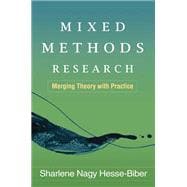This accessibly written book is ideal for use in graduate courses or by practicing researchers and evaluators. The author puts the research problem at center stage, showing how mixed methods designs can fruitfully address different types of research questions. She illustrates the discussion with examples of mixed methods studies from a variety of disciplines and qualitative approaches (interpretative, feminist, and postmodern). The text demonstrates how to navigate ethical issues; gather, analyze, and interpret data; and write up the results, including an in-depth example with step-by-step commentary. Special features include “researcher standpoint” reflections from leading scholars and practical strategies to help users develop their own research perspectives. Every chapter concludes with a glossary, discussion questions, and useful Web resources.








